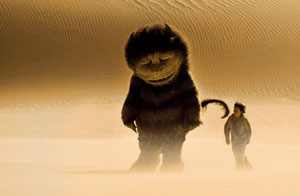
Last week I walked into a theatre thinking I would watch the movie version of Where the Wild Things Are and experience something of a child's joy. Instead, director Spike Jonze offered a view of divorce, neglect and naivety. A glimpse of childhood that, to me, was very familiar.
I read Where the Wild Things Are to death when I was a child. Max's cheeky mischief leads his mother to banish him to his room. Like most kids, I'd had that happen to me on occasion. And, as I was an only child like Max, I would have to come up with a way to entertain myself. Over time, the scene of my punishment became my refuge. The outside world didn't always make sense to me. The world of my parents didn't make sense to me either. It was up to me to make my own world. A world of forts constructed from pillows and blankets and make-believe.
Like Max, too, I remember being deeply perturbed when I learned that the sun would eventually die. The giver of all life, the celestial mother too far away to reach would gradually dim and fizzle out. As a child you imagine these things as being quite violent events; you're unreasonably imaginative, and terrified to accept that all life as we know it will eventually cease to exist. When you're raised on Tom & Jerry and Bugs Bunny cartoons, the sun's demise seems the most cataclysmic disaster imaginable. That's a bit like watching divorce happen.
The flow
My parents separated in 1992 when I was six, and made it official two years later, during the last century's second highest peak in divorces. I remember my mom telling me that "we were broke" and "your dad doesn't want to work," and none of it made sense to me. We weren't broke, but rather, in the slow and painful process of breaking apart. I remember my mom whisking me away to stay with her friend Gloria, a raven-haired manic-depressive whose boyfriend had an uncanny resemblance to Leonard Nimoy. We slept on couches with her cats for a few days before we went back to the house. My father moved out, and diplomatically my parents agreed I would stay with him on weekends. That's when I began building forts again.
It wasn't long before my mother started seeing someone else. His name was James and he introduced me to the wonderful world of Roald Dahl. We watched morning cartoons and he let me braid pigtails in his hair. I could see that my dad was upset and bothered by this new father figure in my life. As far as I saw it, there wasn't much I could do but go with the flow of things. That's how divorced kids learn about loyalty. How children learn about adaptation. How children learn about jealousy.
Watching Max on the screen last week, there he was asking the question: Who is this stranger kissing my mom in the living room? The rage and sense of betrayal carry through cinematically, intimately, as Max peers cautiously over the door frame, curiosity mingled with confusion. Like a lot of children of divorce, I saw very similar things, but didn't understand them. After dinner one night I went into the kitchen to ask my mom to read me a bedtime book. Instead I found her kissing James as he held her head in one hand, wine glass in the other. It wasn't a scene I belonged in. Back into the reading fort I went.
Freud is not my co-pilot
When Max is asked in the film what is the cure for loneliness, he responds that "a little loneliness is good."
There's a sadness and a beauty in the way Max manages his loneliness by using his imagination. He takes himself to a place we've all visited, where our greatest fear is being eaten by a monster, and our greatest defence is becoming bigger than any other person, so big that we become confidant and advisor to monsters.
When Maurice Sendak's book was published in 1964, a dumpster bin-sized amount of literature spewed out, upchucking explanations for the monsters as oversized, morality play characters, each representing a basic human emotion. In Jonze's film version, monster Carol (James Gandolfini) could easily be read as a transvestite with an insatiable sexual hunger, hence his voracious appetite for past kings. The asexuality of these creatures could make for a Freudian buffet of psychoanalytic opinion. The book has been said to demarcate the fine line between fear, comfort and some deep-seated desire to gobble up your own mother. But spare me, please. Enough is enough. This child of divorce isn't interested in living a life obsessively psychoanalyzed.
Jonze has no patience for this either, which is why I left the movie theatre surprised, but satisfied. The film reminded me that loneliness is too easily made into monster, that loneliness also has the power to conjure magic for a child who lives inside excellent forts, and who possesses a storybook that makes her the King of the Wild Things. ![]()
Read more: Film














Tyee Commenting Guidelines
Comments that violate guidelines risk being deleted, and violations may result in a temporary or permanent user ban. Maintain the spirit of good conversation to stay in the discussion.
*Please note The Tyee is not a forum for spreading misinformation about COVID-19, denying its existence or minimizing its risk to public health.
Do:
Do not: